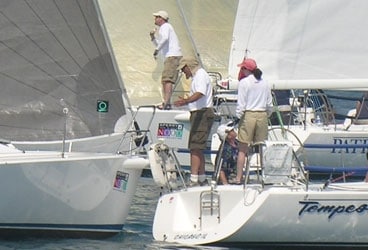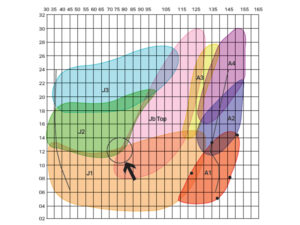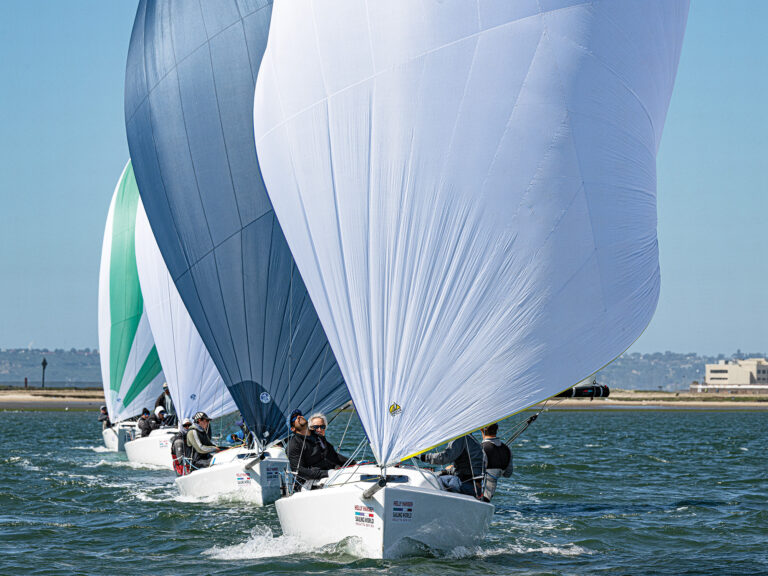
FTEWalker368
I was pleased to find that in the 2007 Spring Soling Bowl my new boat, new sails and new recently bypassed heart were faster than ever to windward, but disappointed that with an old spinnaker we were slow downwind. As we approached the finish line in the first race the one boat that was within striking distance was working to leeward and overtaking us. When we were about five lengths from the line, heading low on port jibe for the port (committee boat) end, he luffed, came toward us rapidly and bore off abruptly into a leeward overlap. His crew immediately began to shout that we must “Keep clear!” “Keep up!” and angrily told us that he had right of Way.
Now in as much as I was heading no higher than was necessary for me to pass the committee boat to port and he, having established his overlap from astern was required to sail a proper course (certainly no higher than mine) and to give us room at the finish mark, I ignored his noisy complaints. Once within the two-boat-length circle, while he continued to shout, we bore down a bit to ensure that we missed the committee boat and slipped across a few feet ahead. This crew had easily beaten me in the preceding world championship, so it was not surprising that they resented my resurgence into a place ahead of them. They would, of course, deny that they resented my speed and success, but their aggressive behavior clearly revealed that they did.
Resentment is the engine of competition and aggressiveness is its hallmark. It was resentment-an angry, aggressive sense of hostility-that drove subordinate members of primitive human packs to acquire the strength and competence necessary to become leaders, and it is resentment that drives modern competitors to acquire the skill and competence necessary to become champions. It is resentment that drives them to advance in the hierarchy of their sport; it is resentment that drives them to protect whatever status they have achieved; and it is resentment that drives them to avenge every defeat. However, modern man finds it difficult to express his resentment. In fact he is made anxious and fearful by expressions of resentment such as anger or aggressiveness. We all feel resentment, but most of us fear to express it.
Only the mentally tough, the top dogs, are free of this fear and it is only the top dogs that feel free to be aggressive. Their apparent immunity from the near-universal fear of resentment seems unfair and is part of the reason they’re resented. The most obvious expression of resentment-anger-is universally condemned. Crews don’t enjoy angry skippers (nor skippers angry crews) and neither enjoys angry opponents. Anger is presumed to be inconsiderate and irrational and, when it is expressed, it is frightening.
Aggressiveness is the other expression of resentment-more acceptable, but for many of us, as frightening. Most of us disguise our anger and avoid being aggressive and presume that anyone who is aggressive-who is able to be aggressive-is expressing his resentment.
To mollify resentment (and glorify his accomplishment), the victor of every battle praises the bravery of the loser and the winner of every race assures the defeated of the difficulties that winning entailed and how fortunate he had been “when the wind shifted his way.” The defeated are all-smiles at the trophy presentation, joining in the camaraderie, praising the winner, trying to convince him and themselves that they admire him and that they harbor no resentment. “Of course, I don’t resent your beating me! Why would you think that?”
Because the typical competitor fears to be aggressive, he presumes that anyone who is able to be aggressive (anyone who is able to express his resentment) must be justified in doing so and must be deserving of the room, the advancement and the victory he demands. The result is that aggressiveness works; by arousing the primordial fear of resentment in the usual competitor, it intimidates. Fearful and preoccupied, the intimidated steps aside and allows the aggressive to pass through. And those who are unable to be aggressive find themselves pushed inexorably down the pecking order.
Only a few-the winners, the higher ranked and the top dogs-are able to be aggressive, but those few can make life miserable for a whole fleet of underdogs and those few have a major advantage (over and above their usually greater competence and experience): their aggressiveness can intimidate, frighten, preoccupy, and distract opponents.Junior sailing programs, which tend to be nests of intimidation, are effective indicators of mental toughness: those who “can’t take” the aggressiveness are weeded out and by the third or fourth summer. Only the tough remain. The more aggressive, gaining competence at a greater rate and complaining vociferously whenever their innocent and less competent peers get ahead of them, use their aggressiveness and competence to win every contest. The less aggressive, overcome by the distressing fear that every session arouses, cease to enjoy the regular beatings, resent “the pressure to win” and, the following season, fail to return.
Olympic classes, which, of course, attract the mentally tough top dogs, also find their ranks are gradually depleted until only the top dogs remain. The Soling Class, when it first appeared in the early ’70s, had dozens of fleets and thousands of participants. But by the time it lost its Olympic status, it had been diminished to a few fleets in a few countries. Many of the friends with whom I raced in the class’s early days were turned off by the Olympians who intimidated them at every start and shouted at them whenever thereafter they got in their way. They at first stopped going to the “big regattas” that attracted the “pros,” but it wasn’t long before many of them sold their boats and quit the class.
No one likes overt resentment, no one likes intimidation, and no one likes to be shouted at. My opponent on the run to the finish in the Spring Bowl had worked his boat to leeward so as to make a final aggressive move upwind at high speed (which, until he established the leeward overlap, he was, of course, permitted to do).
But what had he intended thereafter? Did he not understand the rules that governed his maneuvers after establishing the overlap and feel justified in his complaint? Did he hope that this maneuver would so distract and preoccupy me that I would fail to manage my boat optimally? Or did he intend that his shouts and complaints would intimidate me and cause me to sail high and let him pass? Such behavior might well have beaten a less experienced competitor. Competitors should feel free to maneuver aggressively, to position themselves so as to dominate their opponents, as the rules permit. But attempts to preoccupy, distract, and interfere with the ability of crews to manage their boats, attempts to arouse primordial fears of resentment, attempts to intimidate, either by maneuvers or by shouts, insults, and demands-are not provided for in the racing rules. These techniques achieve their effects by means other than the natural action of the wind and the water.
Unfortunately intimidation does work. It arouses fear and diminishes the performance of those affected, permitting them to be overtaken. It depletes junior programs, Olympic Classes and every fleet and class in which top dogs attempt to use it. And because it works, it is illegal and amounts to cheating.
Psychologists speak of “effective aggression,” which is controlled, useful and appropriate and distinguish it from “hostile aggression,” which is angry, impulsive and distressing. Effective aggression can and should be used rationally and consciously to discourage opponents and to consolidate marginal advantages. But fleets, classes, and regattas should be kept free of overt resentment, of anger, and of intimidation. We show our consideration for our fellow competitors, our style, by hiding our resentment, and we expect them to behave similarly. Just as when we feel fear, we prize fearlessness, so when we feel aggressive, we prize restraint.
Most competitors, fearful of displaying their resentment, are unable to be aggressive. They know that they should at least demand the respect of their competitors and not allow the top dogs to ride roughshod over them. They are distressed both by top dog aggression and intimidation and by the unfairness that prevents them from behaving similarly. A happy fleet and a happy junior program are comprised of individuals who are able to restrain or disguise their feelings of resentment. Their happiness requires that they be led by competitors who recognize that resentment exists, is normal and needs control and who set the standard by expressing no resentment and by insisting that no one else expresses it. Intimidation should be banned and when it occurs, protested. Resentment will continue, of course, but, by obviating its expression, fear and guilt are suppressed, fighting is converted into play and each player feels the satisfaction of controlling his game.
This article first appeared in the September 2007 issue of Sailing World.









